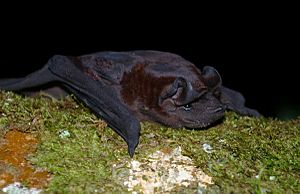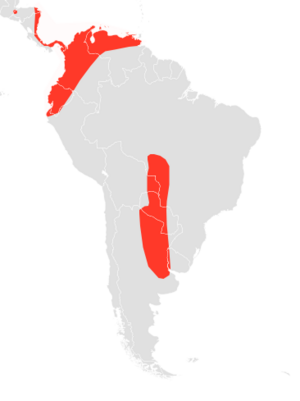Bonda mastiff bat facts for kids
Quick facts for kids Bonda mastiff bat |
|
|---|---|
 |
|
| Conservation status | |
| Scientific classification | |
| Genus: |
Molossus
|
| Species: |
currentium
|
 |
|
| Bonda mastiff bat range | |
| Synonyms | |
|
Molossus bondae Allen, 1904 |
|
The Bonda mastiff bat (Molossus currentium) is a type of bat. It lives in parts of South America and Central America. People also call it Thomas's mastiff bat. This bat is named after a town called Bonda. The town is near Santa Marta in Colombia.
About This Bat
The Bonda mastiff bat is a medium-sized bat. It grows to about 11 cm (4.3 in) long. It usually weighs around 18 g (0.63 oz). Male bats are generally a bit bigger than females. Their fur can be dull black or reddish orange. The fur on their belly is often lighter. Their wings, nose, and ears are black.
Where Does It Live?
The Bonda mastiff bat lives in two main areas. In the north, you can find it in eastern Central America. This includes countries like Honduras, Panama, Venezuela, Colombia, Ecuador, and northern Peru. In the south, it lives in the Mato Grosso area of Brazil. It is also found in Paraguay and northern Argentina. These bats mostly live in tropical rainforests. They prefer areas below about 600 m (2,000 ft) in height.
Life and Habits
Bonda mastiff bats are nocturnal, which means they are active at night. They eat insects. Moths are a big part of their diet. During the day, they usually rest in caves. They also like hollow tree trunks. Sometimes, they even roost inside buildings. Female bats usually have one baby at a time. Pregnant bats have been seen in March and August. Some females might have babies more than once a year.
See also
 In Spanish: Molossus currentium para niños
In Spanish: Molossus currentium para niños


